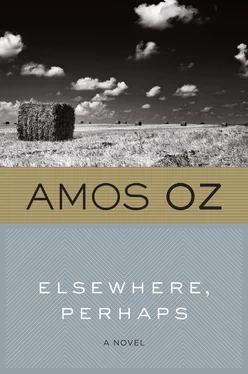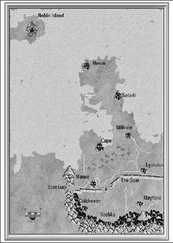Amos Oz - Elsewhere, Perhaps
Здесь есть возможность читать онлайн «Amos Oz - Elsewhere, Perhaps» весь текст электронной книги совершенно бесплатно (целиком полную версию без сокращений). В некоторых случаях можно слушать аудио, скачать через торрент в формате fb2 и присутствует краткое содержание. Год выпуска: 1985, Издательство: Mariner Books, Жанр: Современная проза, на английском языке. Описание произведения, (предисловие) а так же отзывы посетителей доступны на портале библиотеки ЛибКат.
- Название:Elsewhere, Perhaps
- Автор:
- Издательство:Mariner Books
- Жанр:
- Год:1985
- ISBN:нет данных
- Рейтинг книги:4 / 5. Голосов: 1
-
Избранное:Добавить в избранное
- Отзывы:
-
Ваша оценка:
- 80
- 1
- 2
- 3
- 4
- 5
Elsewhere, Perhaps: краткое содержание, описание и аннотация
Предлагаем к чтению аннотацию, описание, краткое содержание или предисловие (зависит от того, что написал сам автор книги «Elsewhere, Perhaps»). Если вы не нашли необходимую информацию о книге — напишите в комментариях, мы постараемся отыскать её.
Elsewhere, Perhaps — читать онлайн бесплатно полную книгу (весь текст) целиком
Ниже представлен текст книги, разбитый по страницам. Система сохранения места последней прочитанной страницы, позволяет с удобством читать онлайн бесплатно книгу «Elsewhere, Perhaps», без необходимости каждый раз заново искать на чём Вы остановились. Поставьте закладку, и сможете в любой момент перейти на страницу, на которой закончили чтение.
Интервал:
Закладка:
"Reuven."
"Yes. What?"
"My father. I was just thinking about him. He was a bookbinder. He was always the treasurer of our branch of the movement. He wanted me to come here, but he also wanted me to be a pianist. For years and years a man calls the daughter of his old age 'Katzele/ little kitten, and then all of a sudden she's an old woman, a mother, a grandmother. She gets fat and she doesn't like her body; she doesn't recognize her own body; she dreams at night about Katzele, and her body is getting wrinkled and dried up and decayed. It's terrible."
"Bronka, why always harp on that theme, why…"
The coffee I make is always tasteless; I've never learned how to make good coffee. He never says anything. He's so gentle. But I don't love him very much, either, because there are things I can't say to him and won't ever be able to say to anyone and they're just the things that are so important and in a few years' time I'll be dead and buried. Bialik says, "They say love exists, but what is love?" They're grand words, but the question has to be asked. Love is when you can say everything. When there's no holding back. When you don't have a red rash. On the other hand, how can one be such a romantic fool at forty-four? Forty-five, actually.
"The coffee was tasteless, Reuven. Don't be embarrassed to tell me the truth. You must always be frank with me. That's why you don't want another cup, isn't it?"
"What are you talking about, Bronka? It was marvelous coffee. Really. Truly."
"Have some more grapes. They're slightly tart, just the way I like them. I can't stand soft ripe fruit, or vegetables, either, for that matter. A soggy banana makes me want to throw up. What are you teaching your class?"
"Shimoni. The Idylls. I marked their essays today. There were some excellent ones. You know, it's struck me how different the German children are from the Russians. The only explanation I…"
He is tormented by nightmares. Even a pure man of sound principles cannot control his dreams. Bronka Berger and Reuven Harish are both grown-up people. A pure friendship has existed between them for many years, a friendship with a firm intellectual foundation. Even though Reuven Harish is of German origin while Bronka comes from Kovel, the two of them are united by a common outlook; they share the same attitudes to education, the same love of nature and mankind. A friendship of this kind cannot suddenly be transformed into violent, sensual love. Even if they do not surrender completely to one another, well, younger couples, too, united by a bond beyond reproach, do not always give themselves totally to each other without holding anything back. The love of Reuven and Bronka is subdued and sparing, and the physical element is not uppermost.
In the old days Eva had a place in the friendship between Reuven and Bronka. In her usual way, with her lively little smile, she used to make a small (but pointed and perceptive) contribution to their conversations. She enriched their conversations with an air of gentle intimacy.
After Eva had left, because she had left, Bronka, naturally enough, felt herself to be responsible for Reuven's well-being. In the early days she spent long hours with Reuven in his room, to prevent him from feeling lonely. She took over such vexing little tasks as ironing his shirts, darning his socks, and making fair copies of his poems.
Ezra did not encourage her in these acts of kindness, but neither did he discourage her. Ezra Berger withdrew silently into himself. If anyone approached him to gloat and drop hints, he responded with ambiguous sayings and scriptural verses. Rumor informed him, too, of the change that had come about in the couple's relationship. Ezra Berger did not make a scene, like a hot-headed youth. He redoubled his devotion to his work and took on the work of two drivers. His simple-minded lack of imagination prevented his jealousy from getting the better of him, we believe. Not that he subjugated his feelings. But a man is made of flesh and blood, and flesh and blood is not myrrh and frankincense but, as the ancient sages have it, "a drop of stinking fluid."
Ten months or so after Eva's departure Bronka responded to Reuven's starved need. Reuven did not run after Bronka, nor did he try to seduce her. That would be hard to imagine. Bronka herself recognized his need and indicated her willingness of her own accord. It was not desire that drove them into each other's arms (whatever prurient skeptics may say) but pure fellow feeling. We do not say this to justify them. There is no justification for adultery. We say it simply to appeal to your compassion.
Reuven gets up from the divan and perches on the arm of Bronka's chair. He places his hand on hers and tells her about the colonel's curious remarks.
"Suddenly, when the rest of the tourists were already back in their bus, he made a sign to me to come closer. As if he wanted to tell me a secret. He was a middle-aged man, but solidly built, almost athletic-looking. He had a mustache and a cigar, and he was carrying a splendid stick. He looked the picture of an honest citizen enjoying a well-earned retirement, if you know what I mean. I went over to him. He fixed me with an odd look and asked me if I had any children. Then he advised me to get out of here, or at least to send my children away. Why? Because from the military point of view we haven't a hope of surviving here. So he announced. 'The mountain will fall on top of you.' He didn't omit to point out his professional standing, his rank, his military experience. The mountain will fall on us, according to the rule of logistics. Nothing more and nothing less. I told him that we observe different laws of gravity. Perhaps he understood. He said good-bye with exaggerated politeness. I'm not telling you all this to boast, obviously, but to show you the delightful sort of things that happen to me in the course of my favorite pastime."
"All right," Bronka said, "you answered him very well. But what I say is that you take too much on yourself. You're not well. You're not all that strong, and… if you were only to rest for an hour every afternoon…"
Reuven Harish smiled but didn't answer. Only his fingers gently stroked Bronka's wrinkled hand. For a few moments they sat in silence. Bronka rested her head on his shoulder. He kissed her. From a great distance there came the sound of a single shot. The echo resounded all around, then merged with the chirping of the crickets, with the murmur of the wind in the trees, with the ever-changing noises of the night that never really change.
Let us avert our eyes from their love-making. There is nothing spectacular about it. It takes place without words, without sounds, without frenzy. A gentle caress, a brief overture, a strained silence. A groan. A relaxed silence.
The night is neither relaxed nor silent. Not our night. The distant motor of the small cold-storage room throbs like a heartbeat in the darkness. It blends with the vague despondent muttering from the hen houses. From time to time there comes a heavy lowing of cattle like a stifled groan. The crickets chirrup without a pause, some with a soft persistent dullness, others with a startling shrillness, starting up and suddenly dying away. From the enemy positions to the east comes the hoarse judder of an engine, and cries, perhaps of men, perhaps of night birds. A jackal's eerie howl rends the air and raises a wild melee of sounds all around, as of a dark ocean swelling up ready to dash its great breakers against our frail houses. Sorrows, delights, and derision merge in a long-drawn-out wail, a sad, sad dirge. Hesitantly, Reuven touches Bronka's face and finds it drenched with tears. He gropes for the light switch. She stops him. You frightened me. It's nothing; you wouldn't understand. How can I understand if you don't tell me. You can't understand if I don't tell you, that's the awful thing. What's awful, Bronka, what have I done to you, why are you. You haven't, only I hope I have a granddaughter, yes, a granddaughter, that's what I want. I would have gone to Father's grave to pray for a girl, only there isn't any grave to go to. You're odd, Bronka, how can anything I do make any difference to that. Perhaps it's not too late, give me a daughter. I'll marry you if you'll give me a daughter, please, please, I can still, I only…
Читать дальшеИнтервал:
Закладка:
Похожие книги на «Elsewhere, Perhaps»
Представляем Вашему вниманию похожие книги на «Elsewhere, Perhaps» списком для выбора. Мы отобрали схожую по названию и смыслу литературу в надежде предоставить читателям больше вариантов отыскать новые, интересные, ещё непрочитанные произведения.
Обсуждение, отзывы о книге «Elsewhere, Perhaps» и просто собственные мнения читателей. Оставьте ваши комментарии, напишите, что Вы думаете о произведении, его смысле или главных героях. Укажите что конкретно понравилось, а что нет, и почему Вы так считаете.












